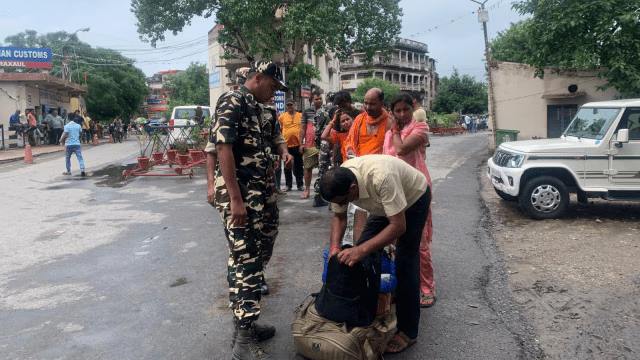From Holiday Dreams to Fearful Escape: How a Bihar Couple Survived the Nepal Violence

Image via The Indian Express
Raxaul-Birgunj Border | Updated: September 12, 2025
Anand Kumar Shah and his wife from Muzaffarpur, Bihar, had planned a peaceful trip to Nepal. They wanted to enjoy the natural beauty of Pokhara and spend some time away from the busy life of their hometown. But on September 12, 2025, their dream holiday turned into a nightmare. Violence spread across Nepal, roads became unsafe, and the couple suddenly found themselves in danger. Their journey back home became a story of fear, confusion, and finally, relief.
A Peaceful Holiday That Did Not Last
The couple had joined a small tour group. Pokhara was calm when they arrived. The lakes were shining under the sun. Tourists were boating, shopping, and clicking pictures. For the Shahs, it felt like a perfect holiday.
But the calmness did not last. Their guide received a phone call. News came that protests had broken out in different parts of Nepal. Young people were on the streets. They were angry over the government’s restrictions on social media. Soon the protests turned violent. Shops were looted. Vehicles were burnt. Police clashed with protestors.
“Our guide told us not to go downhill,” Shah recalls. “There was vandalism everywhere. The roads were blocked. People were shouting. We were scared.”
The atmosphere quickly changed from peaceful to threatening. The Shahs understood that if they did not move quickly, they might get stuck in the middle of a violent crowd.
A Risky Journey Begins
The couple decided to leave Pokhara immediately. Their goal was to cross into India through the Raxaul-Birgunj border, one of the busiest gateways between the two countries.
But the journey was not simple. Many roads were blocked by protestors. Some areas were under curfew. Public transport was irregular. Every few kilometers, the Shahs had to stop and wait. Sometimes they found small vehicles willing to take them further. Sometimes they had to walk short distances.
At every checkpoint, there were rumours. “This road is closed.” “That area is burning.” “Don’t go there, it’s unsafe.” Such voices created more panic. The couple had to trust their instincts and keep moving.
Every night, they worried whether they would reach the border alive. The sound of shouting mobs and the sight of smoke rising in the distance haunted them.
The Border: Confusion and Waiting
When the Shahs finally reached Birgunj, close to the Indian border, they thought their troubles would end. But another challenge was waiting.
The Nepalese side had tightened its restrictions. Only limited crossings were allowed. Thousands of people, including tourists, pilgrims, and traders, were waiting near the border gates. Long lines formed. Some people were crying. Many families were separated.
Indian security forces on the Raxaul side were alert. They wanted to let Indian citizens in but also had to follow safety rules. People without proper documents were stopped. Some were told to return and wait for official permission.
Shah and his wife were lucky. They had their identity papers and residence proof from Bihar. Even then, the process was slow. Officials kept asking questions. Rumours spread that the gates would close again. Hours felt like days.
Finally, after repeated checks, the couple managed to cross. As soon as they stepped on Indian soil at Raxaul, they felt a deep sense of relief. They had survived.
Others Still Stranded
While the Shahs were fortunate, many Indians are still stuck in Nepal. The sudden violence has trapped thousands of people. Pilgrims going to temples, traders doing business, tourists enjoying vacations — all are caught in the unrest.
Some border districts in Bihar are on high alert. The flow of goods has slowed down. Shops near the border are shut. Families in Bihar wait anxiously for news of their relatives still across the border.
The Indian government has issued an advisory. It has asked citizens to avoid non-essential travel to Nepal. Special help desks are set up near the Raxaul crossing to assist stranded Indians. Security checks have also been tightened to prevent any spillover of violence.
A Larger Crisis in Nepal
The unrest in Nepal began with anger over a social media ban. Young people, many of them part of “Gen Z,” used online platforms daily for jobs, studies, and expression. The ban sparked protests that quickly spread to major towns.
The demonstrations soon turned violent. Vehicles were burnt. Stones were thrown at police. Security forces used tear gas and batons. Curfews were declared in some areas. For locals, it was a crisis. For foreign visitors like the Shahs, it was a sudden shock.
The situation shows how fragile peace can be. Tourists come for holidays, but political instability can turn the picture upside down within hours. It also shows how close the lives of people in Nepal and India are. A crisis in one country directly shakes the other.
Lessons From the Escape
Looking back, Shah says he is grateful to be safe. He believes three things helped them:
- Moving early – “If we had delayed even one more day, we might have been trapped.”
- Carrying documents – Their Aadhaar and other ID papers made border crossing possible.
- Staying calm – Instead of panicking, they listened to advice and kept searching for safe routes.
He prays for those still waiting to cross. “I hope the governments work faster to help them. Nobody should feel this helpless.”
Conclusion
The story of the Shahs is more than just a tale of one couple. It represents the experience of hundreds of Indians who travel to Nepal every day for tourism, business, or faith. What began as a simple holiday turned into a dangerous escape.
For now, the couple is safe in Bihar. But their memories of fear and tension remain fresh. Their journey is a reminder: peace is fragile, and when violence spirals, ordinary people pay the highest price.